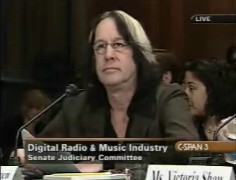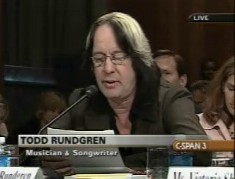Speaking Engagements


Todd testifies before Senate Judiciary Committee
"Parity, Platforms, and Protection: The Future of the Music Industry in the Digital Radio Revolution "Testimony of Todd Rundgren
Hearing on "Parity, Platforms and Protection: The Future of the Music Industry in the Digital Radio Revolution"
Before the U.S. Senate Committee on the Judiciary April 26, 2006 9:30 AM EDT
Additional photos and commentary in the TR Connection Forums (free registration required to view).
Chairman Specter, Senator Leahy and members of the Committee:
My name is Todd Rundgren, I am 58, and I am a professional musician. I have also been employed as a record producer, composer for film and television, technology spokesman and computer programmer. I am the designer and developer of PatroNet, an internet-based subscription service that allows audiences to provide direct underwriting of artists in exchange for insider information, direct communication, discounted merchandise and first-look experiences of the artists' work, all within a community structure.
This is my 40th year as a musician, and 18th year as an independent. I left Warner Brothers in 1998 with the conviction that the major labels were unprepared for, and were indeed hostile to the inevitable changes that digital technology would effect in the way that music would be created, marketed and experienced. I wasn't so prescient that I foresaw the rise of the internet, but I was convinced that I would be hindered in any attempt to use new developments to alter the ground rules.
One of the first cutting edge projects I was involved in concerned digital rights management, a concept that did not yet exist. I was hired by, ironically enough, the Warner Full Service Network, an interactive television pilot project that sought to merge video, computers and high-bandwidth home delivery. The plan was to create on-demand music services that could be navigated on one's home TV -- kind of like an iTunes for the early '90s. When it came time to plug the music in, everything I had suspected about the savvyness of the industry was crystallized. To a label, every one of the majors refused to consider the possibility of putting music they controlled onto a server. Ironically, even the music division of Warner Brothers would not cooperate, even though this was only a demonstration project.
Ever since then, the behavior of the majors has been that of a mindless parasite, contributing nothing, yet trying to get it's snout into the bloodstream of any new development. The knee-jerk justification is "protection of artists", which would more accurately be represented as the interests of highly bankable artists still under contract. For every one of those, there are a hundred with a lifelong bad taste in their mouths over the way they were treated when sales began to lag. I have striven to tie together the "replacement parts" an independent musician would need to build enough audience for a sustainable living. Amongst these is, of course, the internet and a raft of contractors who can press and distribute discs for you and, if you can afford it, take on the promotion and marketing normally provided by a label. The only problem is getting heard. Terrestrial radio, especially of the syndicated flavor, is not available to most artists even if they do have a traditional label deal.
I am opposed to any measures that would insinuate the major labels into an area that they have failed to husband, and to capitalize off of artists they have abandoned or never had any interest in. The myth that you could survive very long on record company advances has long been debunked. Players need to play to get paid and need audiences to play to. All the majors have ever done is try to claim the audience as theirs alone, and to lower expectations by exposing them only to the generally substandard product the majors begrudgingly underwrite.
Worse yet, across the board fee structures like those proposed discourage the exposure of new talent in deference to audience favorites as broadcasters try to recover those fees. And worst of all, syndicated radio, the majors partner in neglect, does not deserve exemption for the abysmal quality of product they deliver. The fantasy that this type of legislation helps music or musicians should be summarily exposed for what it is: yet another futile attempt to turn back the clock to the days when they were the sole gatekeepers to an artist's future.
Thank you for inviting me here to testify today. I would be pleased to respond to your questions.
-
November 2, 1998 - "Webnoize Conference" (Los Angeles)
-
October 29, 1998 - Todd made a presentation at "New Minds Fall Series Conference" (San Francisco). Here's a report from Wired News.
- VISCOMM - San Francisco
- Todd made his presentation on April 26 at "Storytelling for the New Millenium."
- Todd presented "The Secret History of Rock and Roll" at Undercurrents '96 on May 17, 1996 in Cleveland, OH (at the Rock and Roll Hall of Fame).



